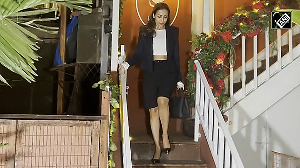Fierce competition, gross over-capacity, high air-turbine fuel cost and dearth of experienced and competent executives are some of the factors that have pushed the airlines in the country in the red, a study has claimed.
"Among the most serious problems created by the airlines for themselves is the gross over-capacity situation -- about 25 to 30 per cent above the actual capacity required," the study 'Civil Aviation in India: Challenges and Prospects' by noted aviation journalist Hamraz P Mama said.Rather than minimising competition, the airlines competed head-on in several routes and tried at one time to grab the market share at the price of profitability.
One time, there were 45 flights each way between Mumbai and Delhi per day -- a recipe for disaster, it said.
The study, sponsored by Observer Research Foundation, asks government to ensure a level playing field by providing various tax reductions and concessions.
"India's international airlines should get ATF at the same price at which foreign airlines get it in India," the report said noting that what the government gains through higher taxes on ATF for India's airlines is more than the offset of the loss to the country through Indian passengers flying on foreign carriers.
The study recommends, among other things, that government should allow India's domestic airlines to operate international services without further delay, as elsewhere in the world, where airlines are allowed to launch international operations from day one.
According to the study, there is a 'dearth of experienced and competent senior-level executive, which makes the expatriates weigh their worth in gold' in the industry.
It recommends for special training courses for airlines management by the IIMs and suggests airline promoters should keep off day-to-day management of their airlines and leave it to the professional, senior executives.
Going into details of the present situation in the sector, the study also suggests that the government should scrap the Route Dispersal Guidelines for the cooperation of Tier II and Tier III routes, as it was causing more harm than good.
"Instead, regional airlines should be encouraged and even subsidised to serve such routes," it said.
The report suggests that some airlines need to trim their flab in order to achieve higher staff productivity and become a leaner and more efficient airlines.
It also notes that there is only one independent MRO facility able to take up third party work in India.
Most airlines have their work done abroad.
However, with the entry of major foreign players into the Indian market, Indian MRO facilities should team up with one of the foreign companies, if these are to survive, the report said.






 © 2025 Rediff.com -
© 2025 Rediff.com -